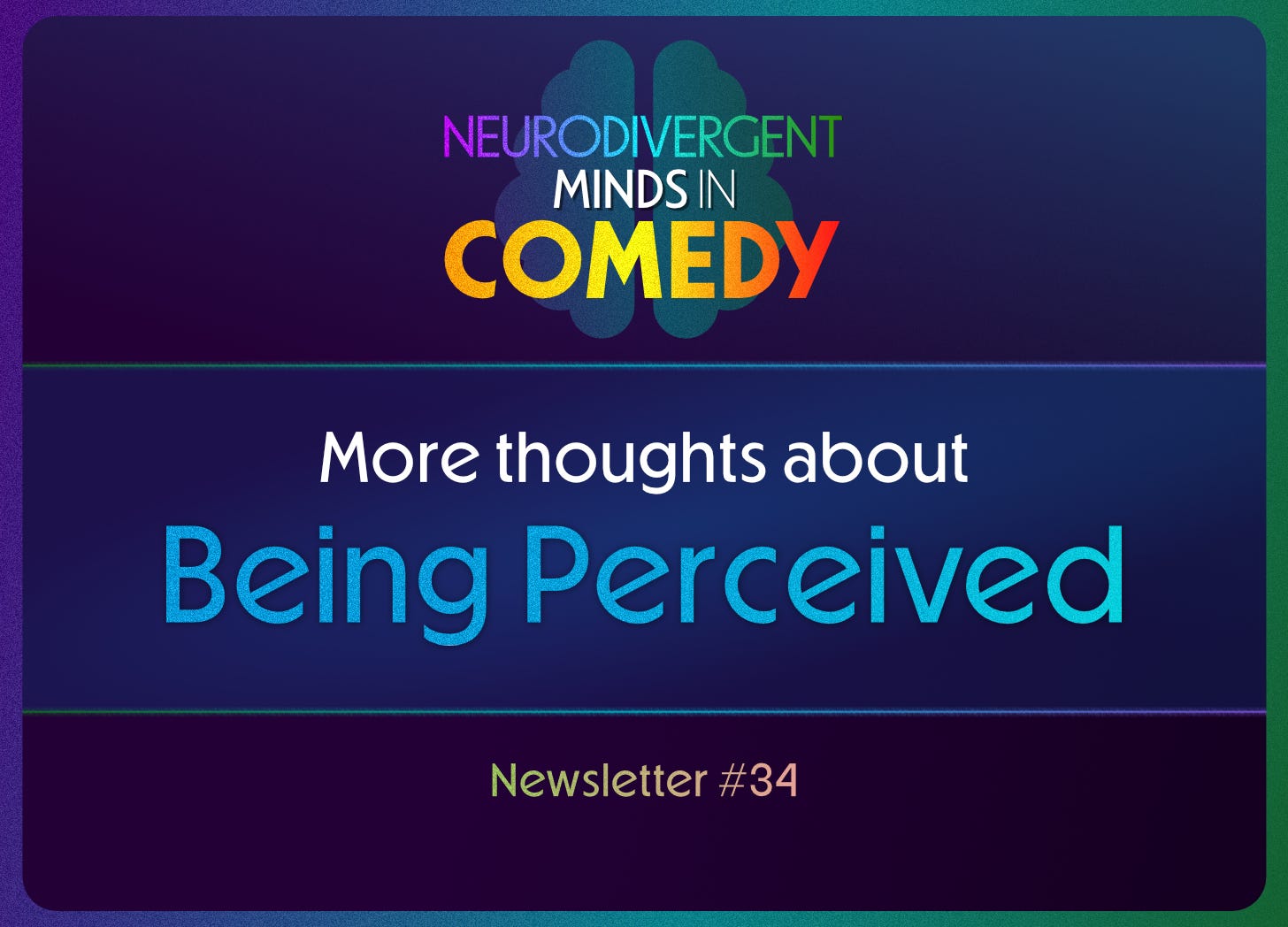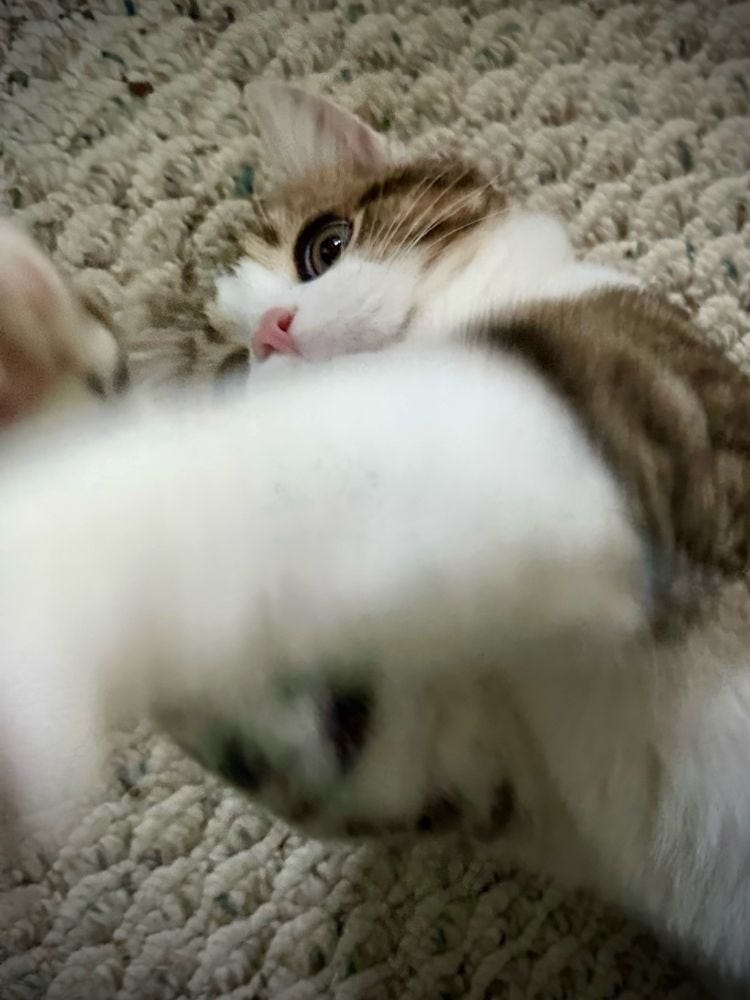More thoughts on being perceived
Being perceived can impact whether or not we ask for assistance, or ask questions in our practice or classes. Why does it happen sometimes?
Welcome to the newsletter, improv friends!
One thing I want to clarify about this newsletter and the associated podcast series. These resources were not intended to be just for neurodivergent students, improvisers, or comedians.
These resources are just as much (perhaps more so) for humans who ARE NOT neurodivergent.
For you to understand us better.
So you make better scenes together.
To teach and coach us in a way that works for our brains.
To listen to the way we work, so we can all communicate more effectively - or at least listen to each other better, and with more patience, especially outside of the scene.
COMMUNICATING BETTER, OUTSIDE OF THE SCENE.
But to do these things, humans have to trust in the relevancy of voices from all parts of the community. And they have to actually take the time and prioritize listening to them as valid and valuable community members.
Is it still possible? I hope! More on that in this week’s essay, below.
In this Newsletter:
More thoughts on being perceived
A palette cleanser
You can still send in your thoughts to share with the community
Neurodivergent Minds in Comedy
Let's talk about being perceived again. Check out episode 2 of the podcast below for what I thought about being perceived about a year ago. I’m sure my perspective has shifted somewhat, as we humans tend to do. Learn and grow and change and stuff.
So what are some of the things I'm thinking about lately? No one asked, but here we are.
I’ve been thinking again about what I discussed in episode 19 about — in class environments — being able to opt out of a scene, or to just DO A SCENE without fully understanding the direction. I gave many reasons why, and how, in that episode.
Note: I’ll embed all linked eps at the end of this section.
And there are various ways to make this scenario better and help the learning path, like options to ask 1:1 afterwards and so on. But these things are covered in the full episodes - or are things you can figure out as best for your own classrooms or coaching sessions.
So — why do people need these options?
Many humans (ones with various neurotypes) might need these options is we have difficulty being perceived when asking questions or seeking help among other difficulties. But these things can be particularly common amongst us neurodivergent humans.
Why?
Some issues stem from a long history of being misunderstood in these scenarios. With bullying, even if it’s far in the past. With being "invisible." All kinds of issues and stressors.
But the biggest one perhaps is being continually and regularly misunderstood in our life, including in “safe” communities and otherwise beneficial spaces.
This means when we ask a question, or ask for help, the question we ask is often misunderstood or misinterpreted. And we have the following add-on stressors1 (some or all) that might lead to not asking for help:
Additional struggle around not understanding the assistance or explanation provided.
And if so, then potentially being perceived by others as not having understood that additional help (say, in the scene or set that follows).
Issues around perceived hierarchies we don’t understand (is it okay to ask for a modification? Ask in this way, at this time, with these kinds of words? Will they think I have a problem with the way they coach?)
Problems with being treated like we’re “questioning the note” in the past (or similar) if they or we stop a scene for help and/or don’t understand the guidance.
A few more on the social side — perhaps difficulties with fitting in to the group, feeling weak or less-than, problems reading social cues… perhaps around being a burden or taking too much time, thinking we’re making a social mistake ourselves (such as inadvertently noting our scene partner by seeking the assistance - see episodes 15, 16 and 17 for more on giving notes to neurodivergent students).
The big thing here is: All of this is happening in front of an audience (teammates or classmates) — that being perceived part, in this situation, can be extra difficult.
So this can lead neurodivergent students not seeking help, like opting out, or “just doing a scene”.
Opting out or just doing a scene is FINE when experiencing this stress without other options offered, or if you need or decide to ask later 1:1 by choice.
But is it valid and necessary? Offering alternatives to address those stressors is great. But it might need to happen, for now, as our lived experience has led us to feel this way for “reasons”.
And again — it’s completely valid, and understandable if you need to opt out - some exercises simply do not work for our brain, and possibly never will. Or we might need to find our own revision that works for us, on our own, over time. There are several exercises like this for me.
Note: Stephen Davidson has written an excellent essay on this scenario, when he needs to opt out of a type of exercise, here.
And “just doing the scene” without adhering to the parts of the set-up that didn’t make sense has inadvertently led to some of my biggest break throughs. So play with these options if and when you’re able to.
Adding options. Do Listening.
Are there ways to reduce these issues, and to perhaps avoid some of them altogether? Absolutely! I’ve discussed it in many of the podcast episodes there are many ways to adjust structures to better support diverse needs in comedy (the ones linked above are a start, but there are many others and even better ones I’m sure you can figure out).
Variety and options are our friends. Conversations. Listening. Patience.
But again, I don’t have all the answers. What I suggest is only the start of a larger conversation I hope communities have one day for the benefit of all neurotypes.
So I ask the comedy and/or improv communities out there:
LISTEN. Outside of the scene especially.
Listen to your teammates.
Listen to your students.
Listen when we neurodivergents or otherwise marginalized communities take on the unpaid, largely unsupported, difficult and vulnerable emotional burden of explaining these misunderstandings to you.
Listen when we try to explain how to be understood better, and what our needs are. Don’t understand? Ask us.
Listen to us. In good faith.
Can we fault listening? Am I just GOING TOO FAR? Not really. I don’t think asking people to listen to each other (in good faith) is ever a bad thing!
Did I say the same thing six times? MAYBE.
To schools and the students
You can have a great, supportive environment at your theater or on your team. Your student might SEEM confident, and fine. You might have set things up as perfectly as you thought you could... for neurotypical students.
But I can assure you that student, one the coach has no idea is autistic because maybe the student has spent 47 years masking it with varying levels of success, isn't always fine on the inside. And is quite possibly not asking that question or seeking your help. Because they can’t today.
They don’t understand the exercise, they need a modification, and they have learnt not to ask because they know the risks. It so often leads to problems, embarrassment, exclusion. No matter how well they think asked, no matter how supportive you think you or your environment is, it’s a calculated risk - and just not worth it.
To the schools: I can assure you, most or all of you need a more varied approach to the classroom and stage that better incorporates your neurodivergent students’ learning needs. I don’t have all the answers. But there are many resources on this site to start the conversation with your own communities if you want them.
To the students: You CAN opt out of an exercise. You CAN ask or figure it out later. Until then, CAN just do the scene, even if you don't fully understand the directions. Ask if you can, but you never have put yourself in that position.
Especially for improv.
Episodes Mentioned
Palate Cleanser
Your Voice, here!
Answer three questions and your answers will be featured in this newsletter! All questions are optional - answer one, answer all three. Voice note is possible too, and I’ll embed it here. Thanks!
Until next time,
Jen.
NeurodivergentComedy.com | StereoForest.com | ImprovUpdate.com
Or, “stress add-on pack”. Is this a thing? It sure feels as such!







